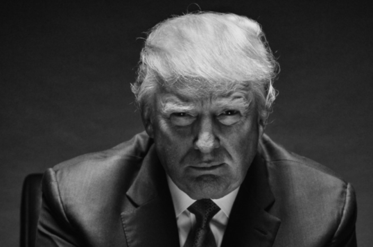Deep State:
Inside Donald Trump's Paranoid Conspiracy Theory
Everything you need to know about the supposed forces within the federal government that the President believes are out to get him
RollingStone, by Michael Hafford, March 9, 2017
As the Trump White House wheezes and lurches its way into actually governing, it's become clear that we are in a somewhat different era in American politics. Unlike the Obama administration, which kept things obscured from the public, the Trump team seems more likely to pop open that top button and let the world see what it’s working with – which has proven to not always be the most effective method thus far.
What constitutes a normal day in Trumpland usually includes a meeting, typically behind closed doors, which sometimes takes hours or even minutes to find its way into the Washington Post, Politico, or the New York Times. To wit: Sean Spicer called a meeting to crack down on leaks. The details of that meeting leaked within days, with a moment-by-moment recap appearing in Politico. Michael Flynn said that he didn't talk to Russia before the inauguration. News broke early February that he had, in fact done so, which led to his resignation just days later. We could go on, but you get the idea. After each story, the White House hammered the message: The leakers are the story.
Until he joined Trump's team, Steve Bannon ran a news site that stoked hatred of everyone from women on birth control to President Obama
This wave crested when Donald Trump accused former President Obama of wiretapping Trump Tower in order to spy on him. Obama denies these charges, though it's possible communications were intercepted as part of a criminal investigation. Trump's tweets were a continuation of his campaign rhetoric that all the forces of the American establishment were aligned against him. He has somehow managed to carry that grievance into the White House, despite occupying the single highest office in the country. But the forces!
The culprit, each time, is something Trump backers are calling the "deep state." Their essential argument is that there are entrenched forces deep within the American government that are working to sabotage the nascent administration, preventing them from enacting policy agenda.
What, exactly, is the deep state?
The term deep state has often been applied to Turkish politics under the dictator President Tayyip Erdoğan, the Turkish would be "derin devlet." People there use it to mean a violent intra-government resistance to the ruling party. Here, people use it to mean unelected officials in the bureaucracy, tech sector and on Wall Street. That also includes the military and contractors, like Edward Snowden. The theory goes that this shadow government works to keep things running smoothly, but it also fights against people that it considers counter to its interests. So there are two strains, government bureaucracy, which is real and keeps the government functioning administration to administration, and the deep state, which is a supposedly a shadow government that pulls the strings behind the scenes.
Duke professor Timur Kuran, who's studied the Turkish deep state, says that suggestion of a deep state is a feature of authoritarian regimes.
"A deep state involves more than an array of vested interests," Kuran tells Rolling Stone. "It involves vested interests that are coordinated by a powerful agent and that obey a hierarchy. In many autocracies, the dictator often blames failures on a deep state ostensibly commanded by an enemy of the legitimate state. Often the perceived enemy is a foreign agent, such as the CIA. In Turkey, which is now an autocracy, President Erdoğan's team justifies his ongoing witch hunt by invoking Turkey's deep state. Supposedly it is run by imam Fethullah Gülen from Pennsylvania, in cooperation with the CIA, Jewish bankers, and assorted other villains. The deep state reaches into the police, the army, the Central Bank, universities, ministries etc. etc. And they all work together, following orders from Pennsylvania."
Sounds familiar, if you swap in Obama for Fethullah Gülen.
Is there actually a deep state?
If you mean entrenched bureaucracy, then of course there is. If you mean a government-wide conspiracy, then the answer is almost certainly no.
Longtime Washington Post columnist and nightly Fox News panelist Charles Krauthammer calls the notion ridiculous.
"I don't believe in the tooth fairy, the Knights Templar, Bilderberg, the Protocols of the Elders of Zion, a vast right wing conspiracy, or, for that matter, a vast left wing conspiracy," Krauthammer tells Rolling Stone. "Are there in the U.S. government individual bureaucrats that are Democratic holdovers that would love nothing more than to damage Trump? Yeah, of course there are. Is there a concealed web of conspirators, malevolent permanent hidden shadow government? Rubbish. And I would add that Lee Harvey Oswald acted alone without the help of Ted Cruz's father."
Deep state theories, to Krauthammer, are part of the natural human desire to order the world. Most likely, Trump is just bad at his job.
What does the supposedly entrenched bureaucratic deep state do?
Essentially, the entrenched bureaucracy is the perpetual motion machine that keeps the government running. Mike Lofgren, a Republican-turned-independent critic of both parties that worked in Congress for 28 years as an aide, literally wrote the book on the deep state, says that it's a necessary part of any large country.
"The deep state isn't necessarily bad," Lofgren says. "You want continuity in the sense that regardless of who is president you need someone to take out the garbage. You need the CDC to make sure that ebola doesn't get into the country. You need airline inspectors to make sure that planes don’t crash. The deep state works like your heartbeat, your pulse, or your breathing. You're not even conscious of it. ... These aren't evil people. They’re just bureaucrats doing their job according to their life. It's only a dangerous development when it becomes separated from participatory democracy."
So the deep state is designed to keep democracy largely running as it does. That means maintaining status quo, which in the case of Trump's ascendancy means fighting against his attempts to change how American government works.
Why is Trump in such major conflict with the bureaucracy?
A few reasons. First, he campaigned on the slogan "drain the swamp." That means what top advisor Steve Bannon calls "the deconstruction of the administrative state." Many people took it to mean that Trump would attempt to cut out lobbyists and corporate interests. Of course, he's stocked his cabinet with billionaires that made huge contributions to his campaign.
Those cabinet leaders all also want to change how their departments operate. Betsy DeVos, who doesn't really believe in public schools, heads the Department of Education. Rick Perry wanted to disband the Department of Energy, which he now heads. Attorney General Jeff Sessions has been accused for years of racial discrimination.
"Every business leader we've had in is saying not just taxes, but it is – it is also the regulation," Bannon said onstage at CPAC. "I think the consistent, if you look at these Cabinet appointees, they were selected for a reason and that is the deconstruction, the way the progressive left runs, is if they can't get it passed, they're just gonna put in some sort of regulation in – in an agency."
Trump also regularly attacked the competency intelligence community and military while on the campaign trail.
Finally, Trump and his cabinet members make demonstrably false statements all the time. Many of the leaks thus far have been anonymous people going on the record to correct Trump and his cabinet's lies. "The leaks are true but the news is fake." That sort of thing.
How normal is this?
Any incoming administration will have a rocky start until they get all their own people in and the old administration's appointees out. The conflict is being exaggerated because Trump and his people often tell stories that contradict the truth and because they're extremely slow to nominate people to fill Senate confirmed positions. That's because, first of all, they didn't really expect to win. It's also because Chris Christie was ousted from the transition team mid-stream, which also meant cutting out anyone that he had picked to fill roles or anyone that was associated with him.
Kuran says that none of this is out of line.
"Every bureaucracy, past and present, contains vested interests," Kuran says. "Every American administration, Democratic or Republican, has encountered pushback from vested interests within various agencies. So there is nothing unusual about the pushback that the Trump administration is experiencing. Bureaucrats don’t like to change established practices. They are threatened by changes in chains of command. They will try to undermine changes dictated from above and even to sabotage them, when possible to do so with impunity."
In other words, it's pretty normal. Prominent examples of the so-called deep state pushing back against Obama include Snowden and Chelsea Manning, neither of whom was a political appointee. The Trump team have borrowed an extremely sinister phrase to describe how the government operates.
What's Trump going to do about it?
A couple things. As we said, he's installing his own people to head the bureaucratic departments that comprise the deep state. He’s also apparently tapping Steven Feinberg, head of Cerberus Capital Management, to review American intelligence agencies. ProPublica reports that Trump has quietly installed around 400 lobbyists to various administrative roles within the government. He's able to do that because his "lobbying ban" was in fact a weakening of Obama’s anti-lobbying rules. These people talk out of both sides of their mouth, we had better get used to it.
Another step that they're taking is just not filling vacancies. The Atlantic ran a long story about how understaffed the State Department is. Key roles have yet to be filled, and the guidance from above is incredibly unclear, so many employees just hang around all day. That's not good for productivity, and it's also not good for not having a bunch of people around with access to secrets.
Given Trump's slow process of actually nominating people, let alone the Democrats' commitment to blocking what they consider unacceptable nominations, this problem could hang around for a long time.
Where do we go from here?
We're probably not done with leaks, that's for starters. As Trump gets more and more of his people into administrative roles, things will work more and more smoothly. But if he and his people continue to lie about their day-to-day activities, and especially about their contacts with Russia, don't expect anything to stay secret.
a campaign for Congress to
support civil service
National Federation of
Federal Employees
Chicago, IL
We Work for America
Everyday
"In many autocracies, the dictator often blames failures on a deep state ostensibly commanded by an enemy of the legitimate state."


